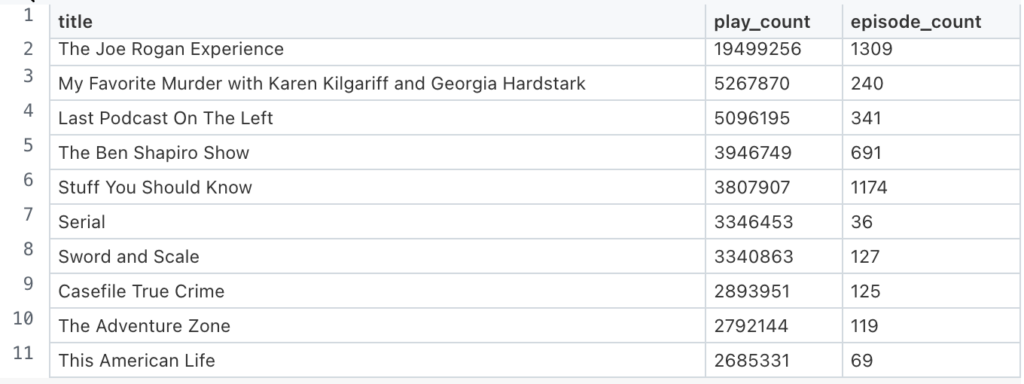Podcast success: a long game

Some of my favorite podcasts have been around for years.
My relationships with these shows have developed over time, across hundreds of listening sessions. Like many other types of media, successful podcasts are often built on loyalty, habit, and an ongoing opt-in relationship.
But here’s the thing: lots of podcasts never get the opportunity to become successful, habit-forming shows.
12%of podcasts have only published a single episode6%haven’t made it past two episodes.- Half of all podcasts have
14or fewer episodes.
Where did these numbers come from?
I analyzed the Castbox podcast directory
If you’re not familiar with Castbox, it’s a popular podcast app for iOS, Android, and the web. According to Libsyn’s latest numbers, Castbox accounted for 2.9% of podcast downloads in September 2018. As part of their service, Castbox maintains a podcast directory that contains hundreds of thousands of shows, both big and small.
This week, I dug deep into the Castbox directory. I wanted to understand episode counts: how many episodes each show has, and any correlation between episode counts and show success.
I grabbed a total of 674,566 unique show listings from Castbox, after excluding duplicates and empty feeds. Some shows contained a single episode, while others listed as many as 5,000 episodes (for example: these high-volume feeds from SermonAudio.com).
As of November 7, 2018:
79,597podcasts (roughly12%of all the shows I looked at) had only published a single episode.- The median episode count per series was
14. In other words, half of all the shows I found in Castbox’s directory haven’t made it past14episodes.
Popular shows tend to have deep back catalogs
If you’re a podcast stats nerd like me, Castbox is particularly interesting because the app displays the total number of Castbox subscribers and plays for each show:

I used these public play counts to build a list of the most-played shows in the Castbox directory. Here’s what the top of the list looked like on November 7, 2018:

This list of most-played shows isn’t surprising. They’re all well-produced, well-marketed shows.
But many of them have something else in common: a deep back catalog. This makes intuitive sense: more episodes yield more download opportunities.
Of course, there are outliers. For example, Serial has a huge play count across a relatively small number of episodes. Same thing with S-Town. But those shows’ episode counts don’t tell the whole story: both series are offshoots from This American Life, an early podcast powerhouse with a 20+ year public radio legacy.
On average, top-performing shows tend to have deep back catalogs:
- The top 100 most-played shows in Castbox have a median episode count of
203.5 - The top 1,000 most-played shows in Castbox have a median episode count of
191.5
On average, the most-downloaded shows have released way more than 14 episodes.
Podcast success is a long game
Not all high-volume shows perform well. Simply releasing lots of episodes isn’t a guarantee that your show will get lots of downloads. But when you look at the most-played podcasts on Castbox, the top of the list is full of shows that play the long game.
The long game means showing up, consistently. Regularly, over time. The first episode of The Joe Rogan Experience was released in 2009. The oldest episode in the How Stuff Works feed is from 2008. Dropping 400 episodes all at once (probably) won’t do you much good.
Remember, podcasting is a medium based on loyalty, habit, and an ongoing opt-in relationship with you audience.
Is your show playing the long game?
Sign up for the Pacific Content Newsletter: audio strategy, analysis, and insight in your inbox. Once a week.
